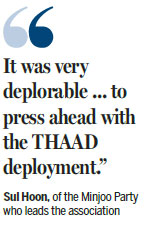Lawmakers round on THAAD decision
Discussion aims to find alternative to planned ROK missile installation
SEOUL - Lawmakers of the biggest Minjoo Party of the Republic of Korea on Tuesday criticized the deployment of the US Terminal High Altitude Area Defense missile defense system in their territory, calling for a resolution through dialogue and negotiations.
A discussion session was hosted by the People's Solidarity for Democracy and Peace, an association composed of 22 Minjoo Party lawmakers, to find alternative to the planned THAAD installation, to which Seoul and Washington agreed in July last year.
On March 6, two mobile launchers and other elements of THAAD were delivered to an unknown United States military base in the ROK. One THAAD battery is comprised of six mobile launchers, 48 interceptors, an AN/TPY-2 radar, and the fire and control unit.
"Just one month is left before a presidential election. It was very deplorable for the acting president and defense chief to press ahead with the THAAD deployment, an issue which is extremely crucial to people," said Sul Hoon of the Minjoo Party who leads the association.

The lawmaker said that the deployment indicates the country becoming part of the US missile defense networking in the region, demanding such a significant issue influencing the country's security be ratified in the parliament.
Prime Minister Hwang Kyo-ahn has served as an interim president since a bill to impeach former president Park Geun-hye was passed in December.
After Park was removed from office on March 10, the acting leader pushed for the THAAD deployment by allowing the first elements of the US missile shield to be delivered to the country.
Denuclearization
During the session, experts said the THAAD installation would worsen the ROK's relations with China and Russia. It would lead to difficulties for Seoul to denuclearize the peninsula and look for cooperation from the two countries in the eventual reunification with the Democratic People's Republic of Korea.
They said the deployment decision was hurriedly made without any parliamentary and public discussions.
An early presidential election is scheduled for May 9. Moon Jae-in of the Minjoo Party and Ahn Cheol-soo of the center-right People's Party are having a close race in presidential polls.
Regional countries, including China and Russia, have strongly opposed the THAAD deployment as it breaks the regional strategic balance and damages security interests of the two countries.
To resolve the THAAD issue, the main panelist proposed to the next ROK government taking the lead in talking the DPRK into freezing its nuclear and missile developments first. Then, Seoul can discuss a gradual lifting of sanctions on Pyongyang with China and the US to achieve the ultimate goal of the denuclearization on the peninsula.
Cheong Seong-chang, director of unification strategy studies program at the private Sejong Institute, depicted the approach as the re-internalization of the Korean Peninsula issues in which two neighbors take the initiative to resolve the peninsula's nuclear issue.
Cheong recommended the next ROK president hold summit talks with top DPRK leader Kim Jong-un to agree on the immediate stop of Pyongyang's nuclear and ballistic missile tests in exchange for the resumption of the Kaesong Industrial Complex in the DPRK's border town as well as the restart of tours to the DPRK's Mount Kumgang resort.
If the agreement is reached, China and the US can agree on the partial lifting of sanctions on the DPRK. In that case, there would be no need to deploy THAAD in ROK soil.
(China Daily 04/13/2017 page11)








